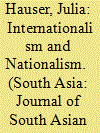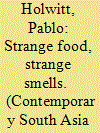| Srl | Item |
| 1 |
ID:
178162


|
|
|
|
|
| Summary/Abstract |
Analysing Indian protagonists’ strategies at the 15th World Vegetarian Congress in India in 1957, this article argues that they brought together Hindu nationalism and internationalism. By constructing non-violence and vegetarianism as a national heritage, they characterised India as a moral superpower above the divisions of the Cold War and endowed it with a global civilising mission. On the other hand, they tried to win international support to influence the politics of the Indian government, opposing parts of the Five-Year Plans and Nehru’s politics of secularism. Moreover, by insisting on India as a vegetarian country, they erased Islam from Indian history.
|
|
|
|
|
|
|
|
|
|
|
|
|
|
|
|
| 2 |
ID:
158929


|
|
|
|
|
| Summary/Abstract |
This paper inquires into the meaning of food – specifically of food smells – for issues of urban citizenship in the context of urban renewal in Mumbai. The city’s southern neighbourhoods are currently being transformed by a process of chawl-redevelopment. Chawl-redevelopment is the primary governmental tool to open these areas up for new residential developments by demolishing old structures and constructing new high-rise enclaves for the rich, while simultaneously promising to provide in situ rehousing to the old, lower middle-class residents. A common feature of these new building complexes is that the most prestigious and luxurious new apartments are sold exclusively to vegetarians. While segregation between vegetarians and non-vegetarians in the real estate market is anything but a new phenomenon in Indian cities, I argue that both popular understandings of this practice and scholarly debates about citizenship fall short of grasping its complexity by essentializing affects or effects of food-based exclusion. Using the concept of sensorial citizenship, the paper analyses the mutual relation between rights and aesthetics in order to understand issues of exclusion and belonging in the contemporary Indian metropolis.
|
|
|
|
|
|
|
|
|
|
|
|
|
|
|
|